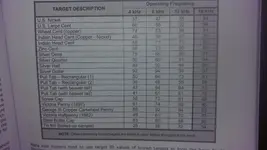You just gave me a great idea on how to create a Sabisch pocket guide/cheat sheet I can have on my phone anytime I need to pull up an obscure mode or setting. Thanks.
Re: the OP. Agree with many of the suggestions above including:
1. Watch Gary vids
2. Invest in Andy's book, if possible.
3. Watch. Calabash Digger's Vids and others such as ThehunterGT's vids.
4. Train your ear with frequent hunts and/or build a sophisticated test garden (again read Andy's book and/or watch Calabash's vids on how to do this). I can't stress this enough. It has taken me a full year to feel like I am perhaps starting to master this machine - kind of like mastering a musical instrument. [e.g., you can certainly find targets out of the box just like you can make musical notes with a piano on day one, but as you master the machine you can start to find some sophisticated targets you would otherwise miss, just like being able to put those notes together to play some recognizable music - uh, oh - did I just take a side trip to Planet Cornball? Deus can lalso make one insane...but that's another story...]
5. I personally would start with preprogrammed modes (esp Deus fast - a great all around program that forms the starting point basis for most of my custom programs) and 4/5 tones and work your way up to full tones using custom programs, many of which are contained in the sticky thread.
6. Become adept at switching between custom programs (frequencies) to get a handle on your target (this is why ID norm does not personally work for me, similar to what jadocs said previously). I also like to switch between the single VCO based all metal gold field pgm and the more traditional discrimination/full tones programs.
7. Read tips scattered about in the Deus forum on how to combat chatty EMI type noise on the Deus by tweaking settings in a logical manner to minimize impact on depth capability (i.e., how to intelligently trade off noise suppresion without sacrificing most of the deep/small targets). Learn some of the quirks of the advanced settings such as silencer which reverts to an undesirably high setting whenever you switch reactivity, killing depth.
8. Learn the importance of how the various ground balance modes can be used under various soil/beach conditions. You can tweak the bejesus out of all the other settings, but if GB is not optimized you can end up making your machine blind as a bat (and I am not just talking about the GB number, but when tracking vs. Fixed vs. Pumping vs. Beach mode should be used).
9. Learn how some of the "secret" modes such as x-y display can be used to visually discriminate junk targets such as bottlecaps which can sometimes sound as sweet as a quarter.
10. Avoid notching out pull tabs/nickels unless you really don't want to find small gold jewelry.
11. Most of all, enjoy the fresh air, exercise, hunting buddies, forum buddies, and have a blast!





